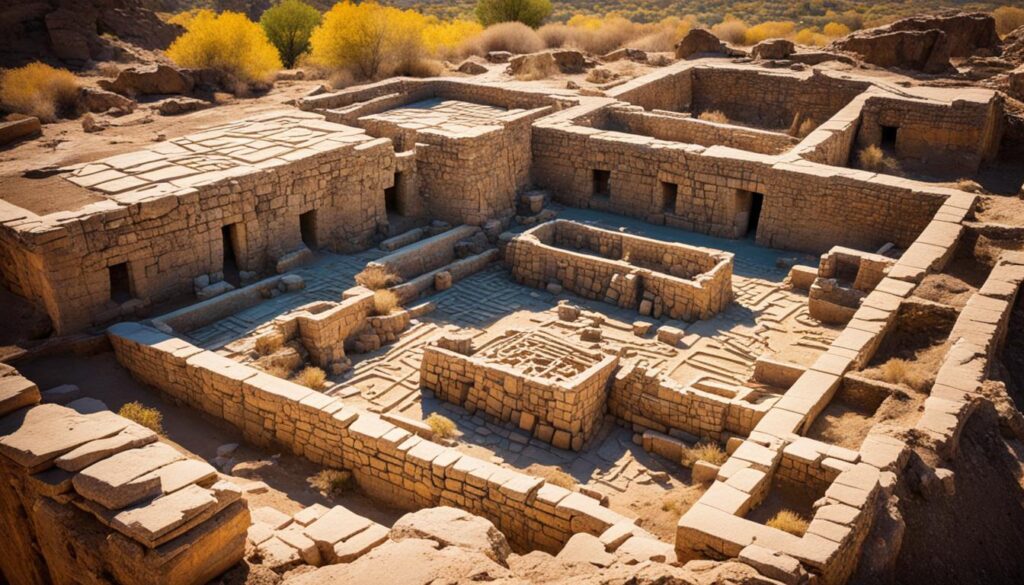Welcome to our exploration of King Herod Antipas, a fascinating biblical figure from the Herodian dynasty who played a significant role in the events described in the New Testament. As the Tetrarch of Galilee and Perea, Antipas ruled during a pivotal period in Jewish history, and his actions had far-reaching consequences in biblical events.
Herod Antipas, often referred to as “Herod the Tetrarch” or “King Herod,” was the son of the famous Herod the Great. He governed the territories of Galilee and Perea as a client state of the Roman Empire, overseeing notable building projects in Sepphoris, Betharamphtha, and his capital, Tiberias.
Throughout his reign, Herod Antipas was involved in significant biblical events, including the arrest and execution of John the Baptist and his role in the trial of Jesus of Nazareth. These events shaped the narrative in the New Testament and continue to captivate scholars and readers alike.
Join us as we delve into the life, reign, and legacy of King Herod Antipas, exploring the historical context and archaeological evidence that sheds light on this influential biblical figure. Let’s uncover the stories and significance behind the name etched in the pages of the Bible.
Key Takeaways:
- King Herod Antipas was a biblical figure and ruler of Galilee and Perea during the 1st century.
- He was the son of Herod the Great and played a role in the events leading to the executions of John the Baptist and Jesus of Nazareth.
- Antipas ruled as a client state of the Roman Empire, overseeing significant building projects in Galilee.
- His actions, including his marriage to Herodias and his involvement in the trial of Jesus, shaped the events described in the New Testament.
- Archaeological evidence provides insights into Antipas’ rule, confirming his presence and impact in the region of Galilee.
Early Life of Herod Antipas
Herod Antipas, born before 20 BC, was the son of Herod the Great and Malthace. His upbringing included education in Rome, alongside his full brother Archelaus and half-brother Philip. While he was not his father’s first choice as heir, Herod Antipas assumed the role of tetrarch following the deaths of his older brothers and the conviction of his older half-brother Antipater. His succession as ruler had to be ratified by the Roman Emperor Augustus.
| Family Members | Education | Succession |
|---|---|---|
| Mother: Malthace | Educated in Rome | Ratified by Augustus |
| Father: Herod the Great | Alongside brother Archelaus and half-brother Philip | Became tetrarch after the deaths of older brothers and conviction of older half-brother Antipater |
“”Herod Antipas, son of Herod the Great and Malthace, was educated in Rome with his full brother Archelaus and half-brother Philip. Despite not being his father’s original choice of heir, Antipas rose to power as tetrarch after the deaths of his older brothers and the conviction of his older half-brother Antipater. His ascension required the ratification of Augustus, the Roman Emperor.”
Reign of Herod Antipas
Herod Antipas, a ruler of Galilee, held his position as a client state of the Roman Empire during his reign. He oversaw several notable construction projects, including the development of Sepphoris, Betharamphtha, and his capital city, Tiberias. However, his rule was not without controversies and conflicts with neighboring rulers.
One significant event that shaped Antipas’ reign was his divorce from his first wife, Phasaelis of Nabataea. He went on to marry Herodias, who had previously been married to his half-brother Herod II. This decision drew condemnation from John the Baptist, ultimately leading to a war with Aretas IV of Nabatea.
“Herod Antipas’ controversial marriage and subsequent conflicts with Aretas IV of Nabatea shaped his reign.”
Additionally, Herod Antipas was implicated in the infamous Massacre of the Innocents, an event where King Herod ordered the killing of male infants in Bethlehem. This tragic event added further tension and discord between Antipas and other rulers in the region.
Roman Empire and Jewish-Roman Wars
During Herod Antipas’ reign, the Roman Empire exerted significant influence over the region of Galilee and surrounding territories. As a client state, Antipas had to balance the interests and expectations of the Roman Empire with the cultural and religious sensitivities of the Jewish population.
“Herod Antipas navigated the complexities of Roman influence and Jewish sensibilities during his rule.”
The Jewish-Roman wars, a series of conflicts between the Jewish people and the Roman Empire, occurred during this period. While Antipas sought to maintain a stable rule and protect the interests of the Roman Empire, these conflicts put additional strain on his leadership and relationship with his subjects.
| Key Events | Significance |
|---|---|
| Divorce and Marriage to Herodias | Led to a conflict with Aretas IV of Nabatea |
| Involvement in the Massacre of the Innocents | Added to tensions with other regional rulers |
| Jewish-Roman wars | Challenged Antipas’ rule and relationship with his subjects |
Despite the challenges and controversies, the reign of Herod Antipas left a lasting impact on the region. His influence can be seen in the archaeological remains of cities like Tiberias and Sepphoris, which provide important insights into the historical context of biblical events.
Antipas and his Role in John the Baptist and Jesus’ Arrest
During the trial and crucifixion of Jesus, Herod Antipas, the ruler of Galilee, played a significant role. Jesus was initially brought before Pontius Pilate, the governor of Roman Judea with jurisdiction over Jerusalem. Pilate, recognizing that Jesus was from Galilee, sent him to Antipas for trial since Antipas ruled over that region where Jesus was most active.
Antipas received Jesus in his court, but after questioning him and finding no basis for charges against him, he sent Jesus back to Pilate. It was ultimately Pilate’s decision to crucify Jesus.
Antipas’ involvement in the arrest and execution of John the Baptist is also notable. John the Baptist had openly criticized Antipas’ marriage to Herodias, his brother’s wife, and faced imprisonment in Machaerus, Antipas’ fortress in Perea.
“Herod had a grudge against John and wanted to kill him. But he was afraid of the people because they considered John a prophet.” – Matthew 14:5
Ultimately, it was at the request of Herodias’ daughter, Salome, that John the Baptist was beheaded. Antipas’ actions in both the cases of Jesus and John the Baptist had far-reaching consequences and played a pivotal role in biblical history.

Key Takeaways:
- Antipas ruled over Galilee and was involved in the trial of Jesus.
- Pontius Pilate sent Jesus to Antipas for trial before ultimately making the decision to crucify him.
- Antipas also played a role in the arrest and execution of John the Baptist, who had criticized his marriage to Herodias.
- These actions shaped the events described in the New Testament and had significant historical and religious implications.
Herod Antipas’ Rule and Legacy
During his reign, Herod Antipas governed the region of Galilee with Tiberias as his capital city. Although his rule was not as ambitious as that of his father, Herod the Great, Antipas made significant contributions to the development of the region.
One notable aspect of Herod Antipas’ rule was his cautious approach to the minting of coins. He issued relatively few and simple coins to avoid offending the Jewish population. By doing so, he demonstrated his awareness of the sensitivity surrounding religious practices and traditions.
In addition to his interactions with the Jewish community, Herod Antipas also had dealings with a group known as the Herodians. The Herodians were Jews who supported Herod Antipas and were tolerant of Roman authority. This alliance allowed Antipas to maintain political stability in the region and further cement his rule.
Herod Antipas’ name appears in the New Testament, demonstrating his significance in the events surrounding Jesus and John the Baptist. His involvement in the trial of Jesus, as well as his role in the execution of John the Baptist, showcases the influence he had on the religious and political landscape of the time.
Overall, Herod Antipas left a lasting legacy in Galilee and beyond. His rule, though not as ambitious as his father’s, shaped the region and its communities. His cautious approach to coin minting and his alliances with influential groups such as the Herodians highlight his ability to navigate the delicate balance between Roman rule and Jewish customs.

With his rule and legacy, Herod Antipas secured his place in history as a significant figure during the time of Pontius Pilate and the biblical events that unfolded in Galilee.
Archaeological Evidence of Herod Antipas’ Rule
Archaeological evidence has shed light on the reign of Herod Antipas, providing valuable insights into this biblical figure’s rule over Galilee. The excavation of cities such as Sepphoris and Tiberias, which Antipas built or expanded, has unearthed a plethora of artifacts and structures from his time. These archaeological remains offer tangible proof of Antipas’ influence and activities in the region.
One intriguing aspect of the archaeological finds is the discovery of coins minted during Herod Antipas’ reign. These coins not only provide valuable details about the economic policies and monetary systems of the time but also reflect Antipas’ political and religious considerations. They serve as tangible evidence of his authority and dominion over the region of Galilee.
“The archaeological remains not only validate the historical accounts of Herod Antipas’ rule in Galilee but also provide valuable insights into the material culture and lifestyle of the time.” – Dr. Rachel Cohen, Archaeologist
Furthermore, the excavation of buildings and architectural structures has revealed the grandeur and scale of Antipas’ construction projects. The city of Sepphoris, for example, showcases the impressive architecture and urban planning implemented during his reign. Tiberias, his capital, also boasts significant structures that provide a glimpse into the administrative and cultural center of Antipas’ domain.
The combination of archaeological evidence, including coins and buildings, along with historical records and biblical accounts, paints a comprehensive picture of Herod Antipas’ rule and his impact on the region of Galilee. These findings not only affirm the historical authenticity of the biblical events associated with Antipas but also contribute to our understanding of the political, economic, and cultural landscape of the time.

| City | Archaeological Findings |
|---|---|
| Sepphoris | Artifacts, structures, and coins reflecting Antipas’ rule |
| Tiberias | Significant architectural remains and urban planning |
Conclusion
Herod Antipas, a prominent biblical figure and member of the Herodian dynasty, played a crucial role in the New Testament. As the ruler of Galilee and Perea during Jesus’ time, his actions shaped several key biblical events. Antipas’ contentious divorce and subsequent marriage led to the execution of John the Baptist, while his involvement in the trial of Jesus added to the dramatic narrative described in the Bible.
The presence of Herod Antipas and his rule in the region of Galilee is further supported by archaeological evidence. Cities like Sepphoris and Tiberias, built or expanded by Antipas, have yielded valuable artifacts and structures from that era. In addition, the coins minted during his reign reflect his policies and religious considerations, providing tangible links to the historical context surrounding Antipas’ biblical accounts.
Overall, King Herod Antipas holds a significant place in Jewish history and biblical events. His rule in Galilee and participation in the events of the New Testament contribute to our understanding of this crucial period. The combination of biblical accounts and corroborating archaeological findings enriches our knowledge of this time, further emphasizing Antipas’ role in shaping religious and historical narratives within the Bible.







